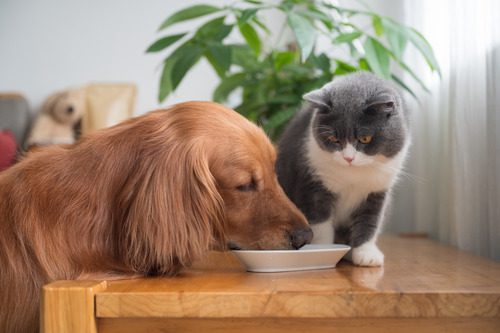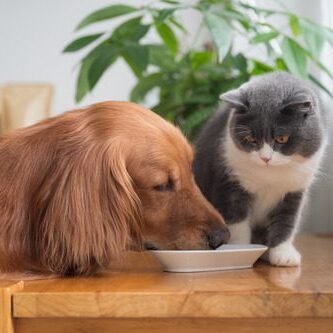If you’ve ever caught your cat sneaking a bite from the dog’s bowl, you’re not alone. Households with both dogs and cats might notice this behavior and wonder whether it’s safe. Pet owners often ask: can cats eat dog food? While cats might seem curious about the aroma and taste of dog food, their nutritional needs differ greatly from dogs. This blog explores why cats and dogs require unique diets, the risks of feeding cats dog food, and what to do if your cat develops a taste for it.

The Difference Between Cats and Dogs as Carnivores
To answer “Can cats eat dog food?”, it helps to understand the biology of cats versus dogs. Dogs are omnivores, meaning they thrive on a mix of animal proteins, vegetables, and grains. Cats, however, are obligate carnivores. This means their bodies are designed to use nutrients that come directly from animal sources.
Why Cats Need Animal Protein
Cats require a higher percentage of protein compared to dogs. Proteins provide essential amino acids like taurine, which cats cannot produce in sufficient amounts on their own. Taurine supports heart health, vision, and muscle function. Dog food generally does not supply taurine at the levels cats need.
Fat and Energy Needs
Cats also use fat as a primary energy source more than dogs do. While dog food may contain fat, the levels are not tailored to cats’ higher requirements. Feeding cats dog food long-term may leave them deficient in key fats and calories.
Can Cats Eat Dog Food in Small Amounts?
Pet owners often notice their cat occasionally nibbling from the dog’s bowl. This raises the question: can cats eat dog food safely in small amounts? A single bite or two usually won’t harm your cat. However, problems arise if dog food becomes a regular part of your cat’s diet.
Short-Term vs. Long-Term Effects
- Short-term: If your cat sneaks a few kibbles of dog food once in a while, there’s little reason to worry.
- Long-term: Repeatedly replacing cat food with dog food can lead to nutrient deficiencies. Cats that rely heavily on dog food may develop health issues over time.
Nutrients Missing in Dog Food That Cats Need
Dog food is not formulated with the nutritional standards required for cats.
Taurine
Perhaps the most important difference is taurine. Without enough taurine, cats can suffer from heart disease, vision loss, and reproductive problems.
Vitamin A
Cats cannot convert beta-carotene from plants into vitamin A the way dogs can. They need preformed vitamin A from animal sources, which dog food may not provide in sufficient amounts.
Arachidonic Acid
This fatty acid is essential for cats but not for dogs. Without it, cats can experience poor coat condition, skin issues, and reproductive difficulties.
Protein Concentration
Cat food typically contains more protein than dog food. A lack of protein in a cat’s diet can lead to muscle wasting, poor growth, and decreased immune function.
Why Cats Are Attracted to Dog Food
Even though the nutritional profiles differ, cats sometimes seem fascinated by dog food. So, why do cats try to eat dog food if it’s not ideal for them?
Curiosity
Cats are naturally curious, and the novelty of another food bowl can spark their interest.
Flavor and Smell
Dog food formulas often contain strong aromas and palatants that may catch your cat’s attention, even if it’s not nutritionally balanced for them.
Hunger and Convenience
If the dog’s food is left out and your cat is hungry, it may simply be easier for them to snack from that bowl.
Health Risks of Feeding Cats Dog Food
The repeated question, “Can cats eat dog food without consequences?”, has a clear answer: over time, no.
Nutrient Deficiencies
Cats on a steady diet of dog food can experience deficiencies in taurine, vitamin A, protein, and arachidonic acid. These deficiencies may lead to serious health conditions.
Digestive Upset
Cats have sensitive digestive systems. Dog food may contain more carbohydrates or fillers that can upset a cat’s stomach.
Weight and Metabolism Issues
If the calorie balance is off, cats may gain or lose weight in unhealthy ways. This can put stress on their joints and internal organs.
How Long Can Cats Eat Dog Food Before Problems Arise?
Some pet owners may wonder if cats can manage on dog food temporarily. While a few days may not cause immediate harm, issues arise with longer periods. Within weeks to months, deficiencies can begin to affect your cat’s health. For this reason, cats cannot eat dog food long-term.
Feeding in Multi-Pet Homes
Households with both cats and dogs often face the challenge of shared food bowls. Preventing your cat from eating the dog’s food can feel difficult, but it’s important.
Separate Feeding Areas
Feeding your pets in different rooms or at different times can reduce food stealing.
Supervision
Supervising mealtime allows you to ensure your cat eats their own food and avoids the dog’s bowl.
Elevated Bowls
Cats can easily jump onto higher surfaces. Placing your cat’s food up high and your dog’s on the floor can help maintain separation.
Alternatives to Dog Food for Cats
Since cats shouldn’t eat dog food, pet owners should focus on proper alternatives.
Cat-Specific Diets
Cats require food formulated for their species. High-quality cat food provides the taurine, vitamins, and fatty acids they need.
Life Stage Nutrition
Kittens, adults, and senior cats all have different dietary needs. Feeding food specific to their age ensures balanced nutrition.
Veterinary Guidance
If you ever have concerns about your cat’s diet, your veterinarian can recommend the best feeding plan for your pet’s health and lifestyle.
When Should You Call Your Warrenville Veterinarian?
Even if the answer to “Can cats eat dog food?” is mostly no, accidents happen. If your cat occasionally eats from the dog’s bowl, watch for changes in behavior, appetite, or digestion. If you notice anything unusual, your veterinarian is the best resource to help assess the situation. At Warrenville Grove Animal Hospital, our team can guide pet owners in Warrenville, IL, with trusted advice about pet nutrition. Call us at (630) 393-1131 or request an appointment online if you have questions about your cat’s diet.
A Healthy Diet Means a Healthier Cat
So, can cats eat dog food? While an occasional nibble may not be dangerous, dog food does not meet the unique dietary requirements of cats. Cats are obligate carnivores who need higher protein levels, taurine, vitamin A, and arachidonic acid. Feeding them a diet meant for dogs can cause health problems if it becomes routine.
For pet owners in Warrenville, IL, the safest choice is to provide species-specific nutrition for your cat. By giving your cat the right food, you’ll help them live a healthier, happier life. To learn more about your cat’s dietary needs or to schedule a wellness appointment, call (630) 393-1131 or request an appointment online today.
About Us
Warrenville Grove Animal Hospital in Warrenville, IL, provides compassionate veterinary care with a focus on building lasting relationships with pet owners. Our services include preventive care, diagnostics, surgery, and same-day appointments to meet urgent pet health needs.

